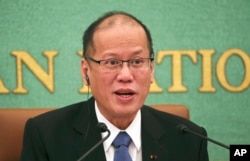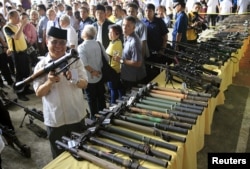Two years after the Philippine government and the country’s largest Muslim rebel group signed a pact aimed at ending four decades of bloody unrest in the south, questions remain about where the peace process is headed.
Before adjourning for a months-long break, Congress failed to pass a proposed law that would create a self-governing region for the rebel area. The legislators won’t be back in session until after the May general election in which Filipinos are set to vote for a new president, who will now determine the fate of the peace process.
The original measure crafted by the government and Moro Islamic Liberation Front (MILF) negotiators, called the Bangsamoro Basic Law (BBL), calls for a parliamentary form of government with shared powers at the local and national levels. The Senate could not agree on competing versions, while the House had better consensus.
Moro Islamic Liberation Front leaders have acknowledged discontentment among the rebel group’s ranks and peace workers have expressed fears the younger generations might return to arms.
The Front’s head negotiator Mohagher Iqbal talked to reporters on the sidelines of a two-year anniversary commemoration of the peace pact at Notre Dame University in Cotabato City. He said since Congress ended its session, he had been crisscrossing the provinces and cities within the proposed Bangsamoro region.
“That goes to show that we are really handling the situation,” said Iqbal. “It’s very tough. But it can also show the command and control of the MILF, that our people, our commanders, our combatants as well as members of the MILF are still listening to the MILF.”
In a speech at the commemoration, government peace panel chair Miriam Coronel-Ferrer pointed to nearly 20 years of peace negotiations in which both sides overcame breakdowns that lead to skirmishes.
“With all due respect, I disagree with those who are saying that we have nothing to celebrate because we did not get the BBL,” she said.
Speaking with reporters, Ferrer highlighted programs and aspects of the deal that were not dependent on the passage of the law. She noted the skills training programs underway to help former rebels in the deeply impoverished Muslim-majority region.
Jacob Palao, a 57-year old rebel who participated in a decommissioning event in June last year, attended the commemoration at Notre Dame. The former deputy commander for the rebels’ combat operations told VOA he was completing training in dressmaking.
He also said his son, who had to stop college because the family could no longer afford it, had gone back to school thanks to help from the decommissioning program, which includes $53 million for education, social welfare and other benefits.
Palao, a spokesman for the dozens of rebels who laid down their arms last year, said the fighters would continue to support the process despite the non-passage of a basic law and a change in administration.
“As long as our peace panels are still there working, we will not lose hope,” he said.
But as it stands the current peace process has fallen far behind its proposed timeline of having the law passed, the autonomous region determined and a new local parliament in place by June this year. That is when President Benigno Aquino steps down.
International Alert’s Philippine country manager Francisco Lara said peace-builders like his organization are looking at three scenarios once Aquino leaves: a continuation of what started under the current administration, making the proposed basic law a starting point with expected revisions or entering into new negotiations altogether. He said that last option could see the rebels walk away.
Lara said the programs that are part of the peace pact but do not fall under the proposed law will be particularly vulnerable because whoever comes into office may not prioritize funding for them.
“They don’t need to shut it down. All they need to do is just ignore those bodies that have been created. I’m talking about the decommissioning bodies, the normalization committees, the transitional justice and reconciliation committees,” he said.
Lara said as long as there is no formal termination of these offices, the terms of the signed pact are not violated.
In his speech at the commemoration of the agreement, Iqbal emphasized the importance of the pact.
“Now that our legitimate grievances and aspirations have already been recognized and affirmed not only by the government of the Republic of the Philippines but the nations of the world, do you we have to stop in our struggle just because the moment is not favorable to us?” said Iqbal. “No. I personally urge everyone to stand up for peace. Long live the Comprehensive Agreement of the Bangsamoro.”
Decades of fighting in the southern Philippines has left more than 120,000 dead.


